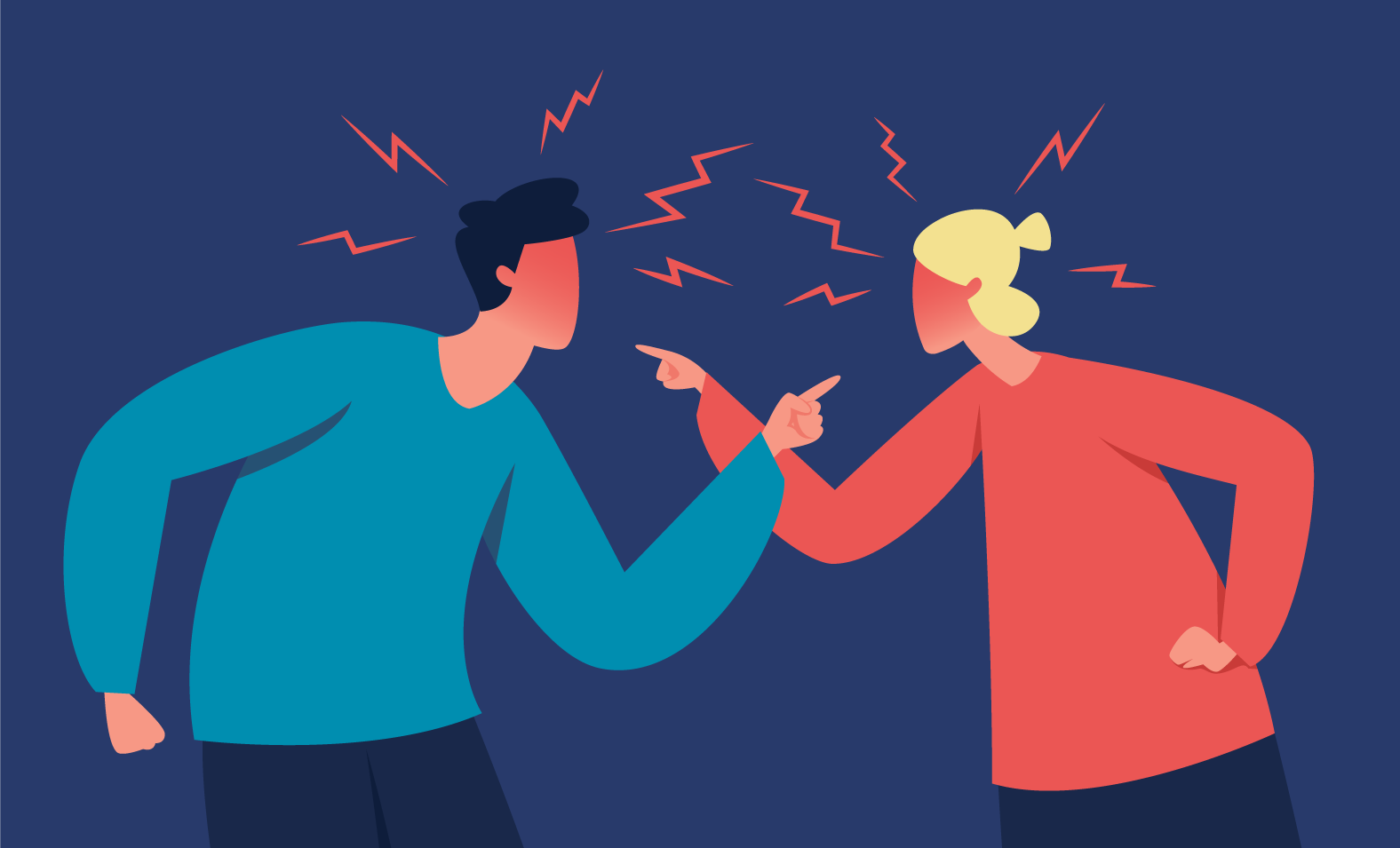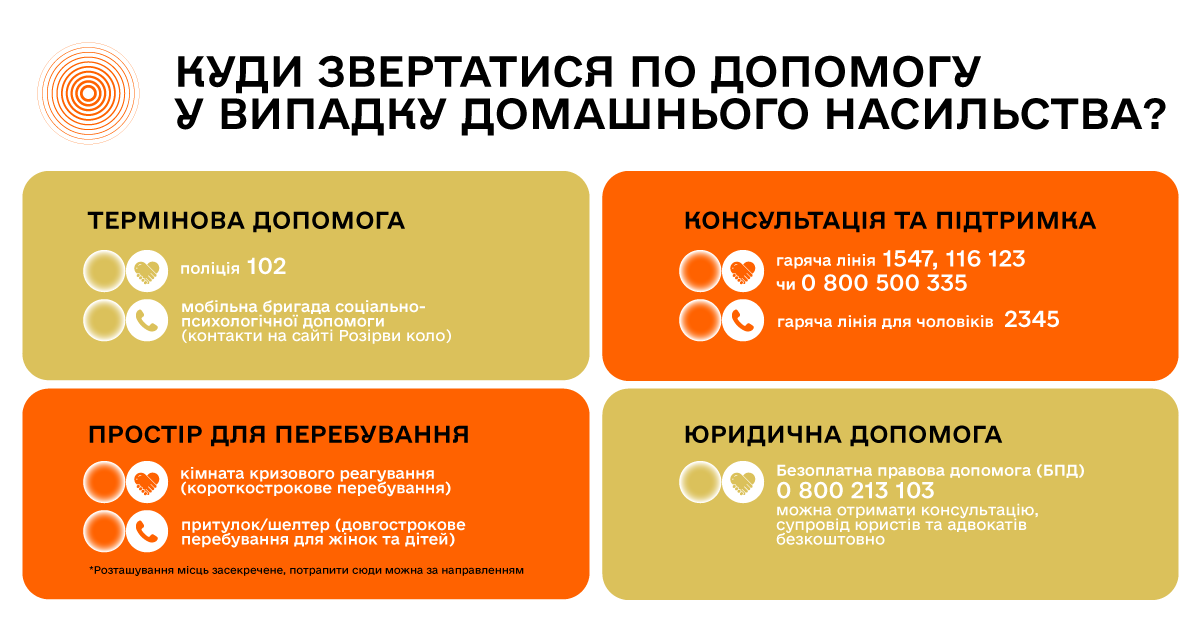How to recognize domestic violence and where to seek support
- Центр громадського моніторингу та контролю
-
•
-
18:31, 28 November, 2023
Humiliation, manipulation, blackmail, beatings. It's all about domestic violence. Unfortunately, the problem did not disappear during the war. On the contrary, it only increased. According to the Ministry of Internal Affairs, only in the first half of 2023, the number of complaints about domestic violence increased by almost 40%, compared to the same period last year. But it is very difficult to talk about such cases in one's own family. Some people still do not want to take the problems out of the house, they are afraid to take a step: to report the abuse and ask for help. So domestic violence remains invisible, and perpetrators go unpunished. What to do is in the material of the Center for Public Monitoring and Control.
Domestic violence is not only physical
We still have many myths about domestic violence that prevent it from being overcome. One of the most common: «Violence is just beatings.» However, in reality it can take different forms. Humiliation, oppression and insults also leave their «scars», although inside, not outside, those who find themselves in a situation of violence.
It is not for nothing that several types of domestic violence are distinguished. In addition to physical, there is also psychological. When a person is under constant pressure from a partner or relative, he reports on his every step. She is being manipulated, harassed, controlled, threatened or blackmailed.
Economic violence also often goes unnoticed. The abuser does everything to make a person completely dependent. She may not be allowed to work or study. Often - allegedly to make life easier, because they will take care of her. In the end, a person must ask for money for the smallest detail, report every purchase down to the last penny, ask permission for any decision.
Inclination to unwanted pregnancy or abortion are manifestations of sexual violence, which can also be difficult to recognize. In addition, this is sex without consent. And forcing to record an intimate video, if a person does not want it, is also sexual violence.
Since the beginning of the year, almost 30,000 people have contacted the National Domestic Violence Prevention Hotline from the La Strada organization. Victims and witnesses mostly called at night and reported, first of all, psychological and physical abuse in the family. There were also reports of economic and sexual violence. 76% of applications came from women. Although women are more often victims of domestic abuse, it can happen to anyone. It is important to remember that domestic violence does not depend on gender or age. Children, elderly people, women, and men suffer.
Only the offender is guilty
Another extremely harmful myth that prevents the recognition of violence in the family: to consider responsible for abuse not only the abuser, but also the one who suffers from violence. Sometimes you can hear that the person allegedly «provoked» the aggressor himself or that both are to blame. This myth affects the victims themselves. And instead of asking for help, they begin to look for problems in themselves, to believe in their guilt. They believe that by changing their behavior, they will be able to avoid the aggression of the offender. But it is not so! Only the perpetrator is always to blame for violence. There can be no excuses for bullying and violence. It is the offender who must be punished.
They will NOT figure it out themselves
The fight against violence is hindered by the myth: «This is their family. They will figure it out themselves.» He leaves the victims alone with the offender. After all, those who should become a support do not want to interfere in «other people's affairs». However, the support of others is very important, it can give strength to ask for help. A person sometimes does not realize that he is suffering from violence. And what is happening to her is not normal. Or he understands the situation he is in, but is afraid or ashamed to break this circle of violence. And the support of those closest to you: friends, relatives or acquaintances in such situations is very important. Their role is not to judge, not to criticize, not to teach, but to become a reliable «shoulder» on which you can lean when it is very difficult.
Among other myths that only get in the way: «Hit means love.» Everyone lives like that.» Because of this prejudice, many victims do not seek help for years and live in constant fear and stress. But love and violence are completely opposite things. They do not seek to hurt those they love. Moreover, violence is not a norm, but a crime. And it will not disappear by itself. To overcome it, you need to act!
Where to turn for help?
Another myth is that only victims can apply for help. In fact, both witnesses and close friends of those who suffer from violence can and should seek help. Keep useful contacts, because they can come in handy at any moment.
-
Police (call number 102) – can provide urgent help: stop the violence, record the incident, inform the victim and refer him to other services.
Also, for urgent intervention in the situation, you can contact the mobile teams of social and psychological assistance. Look for their contacts in your region on the Break the Circle website
-
Support and advice can be obtained from the government hotline 1547 or the National Domestic Violence Hotline 116 123 or 0 800 500 335. All calls are free, you can contact anonymously, and specialists are ready to help around the clock.
-
Specialized psychological counseling and support for men will be provided at number 2345. Anonymous and 24 hours a day.
-
A crisis response room provides a safe, 24-hour space for short-term stays. The geographic location of the crisis room is classified. You can get here through a personal application, a referral from the police, a mobile brigade or other social services.
Women and children can stay for a long time and receive comprehensive assistance in an asylum/shelter. This is a safe and classified place, you can get there by referral from the police, mobile brigade or other social services.
-
Free legal assistance, consultation and assistance from professional lawyers and advocates can be obtained by calling 0 800 213 103.
There are no excuses for violence. Please ask for help or be there for those who need it.
Source: Center for public monitoring and control


